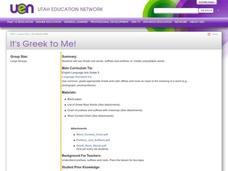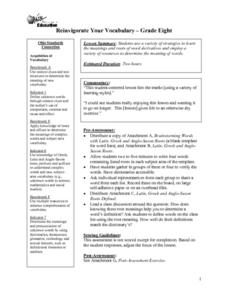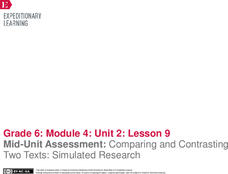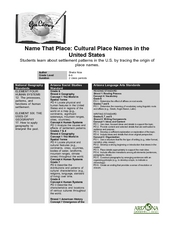Curated OER
Latin and Greek Roots Lesson Plan: Creating a Board Game
Learners explore Latin and Greek roots. In this vocabulary lesson plan, students create a board game featuring Greek and Latin roots.
Curated OER
Vocabulary and Concept Development #2: struct and tract
Focus on the Latin roots struct and tract with this PowerPoint, boasting plenty of practice opportunities. To help develop a definition of each root, viewers match a list of words to their pictures. Then, they compare those words to a...
Curated OER
English Words from Greek and Roman Names of Gods
Hydra/hygiene, Muse/music. Many English words are built on roots derived from the names of Greek and Roman gods. After examining a list of Greek and Roman gods and the meaning of their names, class members find the root in a list...
Curated OER
Word Roots 2: FIN, SED, FER Beginner Definitions Match 1
Consider this online matching activity to assist your class with vocabulary and word roots. Class members select a definition for each listed vocabulary word using a drop-down menu for each response. Learners receive immediate feedback,...
Curated OER
It's Greek to Me!
Use Greek roots, suffixes, and prefixes to create polysyllabic words. Readers use the dictionary to identify what the word's prefix, suffix, and root or base word mean. They define what a syllable is and how one is formed using Greek...
Curated OER
Vocabulary Set 3
The Latin roots sent/sens, soph, and tend/tent are featured in this vocabulary-building vocabulary presentation. The definition of the root is provided and then a word built on this root is used in a sentence.
Curated OER
Root Words
Eighth graders practice finding the meaning of words by analyzing the root word. In this root word lesson, 8th graders review a chart of roots, words, and meanings. Students find and list words that have the root of 'geo,' 'terra,' and...
Curated OER
Roots
Students are introduced to Latin and Greek roots, prefixes, and suffixes. They are given a lesson on ten root words that students identify the correct meaning of the words. Students design cards that are divided into four parts.
University Interscholastic League
English Lesson to Prepare for UIL Spelling and Vocabulary Contest
"i before e. . ." Spelling is easier if kids know the eight basic spelling rules contained in this resource packet.
EngageNY
Research Tasks: New Words, Relevant Information, Revision
Word builders. Scholars participate in a mini lesson about affixes. They then complete a research vocabulary organizer and share their definitions of the words with the class. They gather more evidence for their research from the...
Curated OER
Rooting One's Way To Meaning
Students use a thesaurus on the internet to explore the meanings of Greek and Latin roots. They find definitions of given words, draw a concept map for root words, and write four synonyms for each word. Students discover how Latin and...
Curated OER
It's All Greek and Latin to Me!
Give your pupils a skill they can use for life by introducing the use and comprehension of Latin and Greek root words.
Curated OER
Rooting One's Way to Meaning
Discover the Virtual Thesaurus with your class. They use the Virtual Thesaurus to assist them in an inquiry-based approach to discovering the meanings of some common Latin and Greek roots. Each child then teaches a particular root and...
Curated OER
Reinvigorate Your Vocabulary
Eighth graders participate in a variety of activities to examine the meanings and roots of word derivatives and the meanings of words. Using context clues, they determine the meanings of words omitted from a passage and complete a prefix...
EngageNY
Mid-Unit 1 Assessment: Human Rights Vocabulary and Common Prefixes
Here is a mid-unit assessment for a group of lessons studying the Universal Declaration of Human Rights (UDHR). The first half of this instructional activity calls for several forms of review. Your class will review the content of the...
Book Units Teacher
Skill Lessons – Prefixes and Suffixes
Sometimes the best way to understand a concept is to break it down. Young vocabulary pupils work with word parts in a hands-on activity that prompts them to connect flash cards with affixes to their root and base words....
Curated OER
Greek, Latin and Anglo-Saxon Roots to Better Vocabulary
Seventh graders review the concepts of affixes and roots. They practice common Greek, Latin, and Anglo-Saxon ones which are used to form many words in English. Students develop an awareness of the formation and evolution of words.
EngageNY
Close Reading: The Introduction to the Universal Declaration of Human Rights
As part of a group of lessons, your class will return to the primary text for this unit, the Universal Declaration of Human Rights. Key vocabulary as well as close reading strategies continue to be the focus skills; however, this lesson...
EngageNY
Summarizing Complex Ideas: Comparing the Original UDHR and the "Plain Language" Version
The eighth lesson plan in this series continues the focus on vocabulary and increasing young readers' awareness of academic language. Pairs of learners participate in a short vocabulary review activity called Interactive Words in which...
Curated OER
Practice Book O
Whether you need resources for reading comprehension, literary analysis, phonics, vocabulary, or text features, an extensive packet of worksheets is sure to fit your needs. Based on a fifth-grade curriculum but applicable to any level of...
EngageNY
Mid-Unit Assessment: Comparing and Contrasting Two Texts: Simulated Research
Shoo fly. Scholars read DDT Spray Scares Mosquitoes Away, Study Finds and You Think You Have It Tough? to complete a mid-unit assessment. The learners compare and contrast author presentation and conduct a credibility check on each...
Alabama Learning Exchange
Echolocation Stations: Exploring Sound
Fourth graders explore the concept of echolocation during a unit on whales. They listen to the book and watch the Reading Rainbow video for "Humphrey: The Wayward Whale," explore various websites, and conduct experiments to demonstrate...
Curated OER
Name That Place: Cultural Place Names in the United States
Students examine the origin of the people that settled in the United States. In this United States History lesson, students work in small groups to complete several activities that explore early settlement, such as a worksheet, a...
Curated OER
Centipede or Millipede?
Students discuss millipedes and centipedes in terms of their classification as arthropod. Using a diagram, students categorize and compare and contrast the characteristics of millipedes and centipedes based on their discussion of...

























